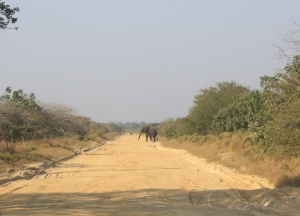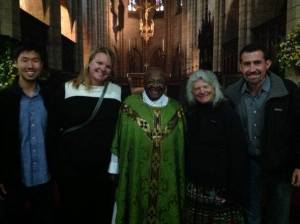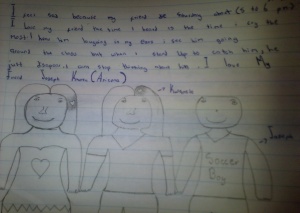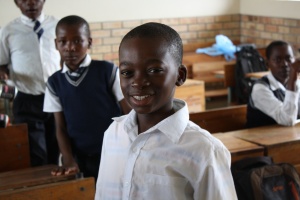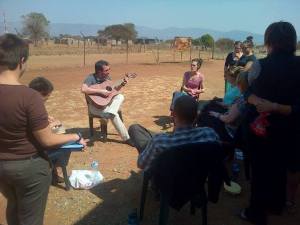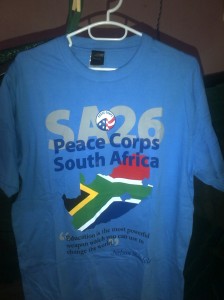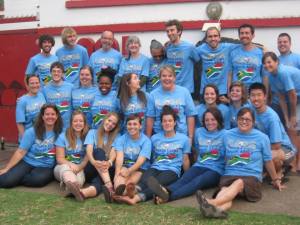When I set up this blog before leaving for South Africa, I wasn’t exactly sure how often I would be updating it. I had read blogs of other volunteers and saw things I liked and other things I wasn’t too crazy about. But like most other parts of this entire Peace Corps endeavor, I really didn’t know how it would work for me until I was in the middle of doing it.
Also at the time of setting up my WordPress account, I subtitled this blog “a collection of (hopefully) interesting tales from South Africa.” With that, I unwittingly gave myself a mandate of what should be included here.
Interesting. Interesting.
After some time at my home in KZN and realizing how often I would actually be able to make updates here, it became apparent that for a story to be written it first had to be interesting to me. The “(hopefully)” part is that the reader finds it as interesting as I do.
For the first six months of living here at my site, everything was interesting, because everything was new: new home, new language, new job, new people in my life, new food, new societal expectations of me, new methods of transportation, new ways of getting clean water into my house, new indigenous plants and animals to take pictures of, and on and on. Anyone in the states who was interested to see what was up with me could come read a story of something that happened here from my fish-out-of-water point of view; something with a beginning, a middle and an end that describes some of the very different aspects of living here along the way.
But then, the “R” word happened: routine. My mornings, my afternoons, my evenings, my nights, my weekends: I know what to expect, and I know when to expect the unexpected. The setting may be different, but the story of living a life doesn’t feel so. I have the same successes and disappointments with my job, my family, my employer, my house, my coworkers, my friends, and … you can fill in the blanks … as anyone making their life anywhere in the world.
I have developed a routine around all the differences living here from what an American is accustomed to, so it has become harder for me to discern the interesting stories.
Even a getaway to a different city or country doesn’t seem so remarkable in story-form, even if the place itself is. After all, I’m traveling with good friends and when I get to the destination, I see pretty much what anyone would go there to see. Those stories seem to be told better through the lens of a camera than through words on a blog. Essentially: “This is what I saw; this is what people come here to see, and now I’ve seen it, too. I’ll remember it, because it was wonderful and I have these great photos.”
This may seem like I am pining for something exotic – that I’ve run out of stories to tell. But honestly, I’m glad I’ve been able to settle into a routine. Some volunteers don’t have that luxury. Some struggle. Some go home early. I’m really happy that I’m comfortable in my living situation. Moreover, my work keeps me pretty busy and I have enough small, everyday successes to counteract the regularly delivered disappointments and failures that seem to be inherent with teaching in a rural South African primary school.
So, with all of the above serving as a disclaimer (and maybe just a big ol’ excuse as to why there isn’t more to read on this lonely little website), I’ll give you some highlights and anecdotes from the past four months.
Mozambique
In late June during the winter break between school terms 2 and 3, I travelled to Mozambique with PCV friends Michael and Katrina, and a new friend from the USA, Michael’s college buddy, Elliot. In a nutshell, Mozambique is gorgeous, especially along the coast. We travelled in 4×4 passenger vans (off-road versions of the Toyota Quantums that are so common for public transport in South Africa) from the southern border of Mozambique. We stayed a few days in Ponta do Ouro, a little beach vacation destination in a cool little hotel right on the beach. It is beautiful.
From there we went north to Maputo, Mozambique’s capital. Many reviews paint it as a beautiful and vibrant city, but our experience was less than stellar. I think it was a truly beautiful and modern city at one time, but when I saw it, it was mostly dirty, and in disrepair. I ate some delicious bread and pastries and visited some interesting open-air markets there during the day, but the one night I decided to venture out to see some live music, I was stopped twice by machine gun-wielding police officers demanding to see my passport and visa. There were no problems, as all of my paperwork was in order, but that type of experience is unnerving to me. I was happy to come back to the relative safety and security of South Africa.
On our way back to South Africa through the dirt roads of southern Mozambique, we encountered an elephant crossing the road. Since it wasn’t in a hurry, we had plenty of time to look at it (from a very safe distance) through the windows of the van. I handed my camera to Michael, who had the best vantage point of the four Americans in the overcrowded transport, and told him to go crazy with the shutter. I’d sort them out and find the best ones later.
Cape Town
After a few days back at my home, it was July and I was gearing up for a trip to Cape Town. I travelled south to Durban by public taxi with my PCV friend, Shawn, to meet up with another PCV friend, Ted. After one night in Durban, the three of us travelled by bus for twenty-four hours straight to Cape Town.
At the Cape Town bus station, we met up with another PCV friend, Eva. After eating at McDonald’s, watching a street magician perform some card tricks, and browsing at a musical instrument shop all right there at the station, we met up with our PCV friend, Vanessa, and another new friend from the USA, Vanessa’s family friend, Laurie. The six of us piled into a rental car (thanks Laurie!) and headed to Strand – the beautiful beach area to the east of Cape Town that housed the time-share condo that became our center of operations for Cape Town sight-seeing for the next week, as well as a bunch of sharing of movies, music and TV shows. (PCVs have to get American entertainment somehow, right?)
For that week we saw lots that you would expect for a trip to Cape Town: Robyn Island, Table Mountain (hiked up, and took the cable car down), a tour of some of the wineries of Stellenbosch, South African penguins, historical sites, a drive through a township, museums, restaurants, and beautiful views of the ocean(s).
What we didn’t expect was befriending our incredible winery tour guide, Zaahid, to the point of being invited to his house for dinner with his family. He told us of his heritage – “Cape Malay” – of Indonesian descent, though his ancestry had been living in Cape Town for generations. He is Muslim, and invited the six of us to break the fast for that day of Ramadan – which happened to coincide with our trip to Cape Town – with his family. It was educational and quite an honor. And, it was delicious. The food his mother and sister prepared beats traditional Zulu food with a stick (no offense, Zulus). We got to take some leftovers back with us, and he even drove us back and forth to dinner in his tour van.
(I think it should go without saying that I highly recommend him as a tour guide for anyone planning to go to Cape Town, but just in case: http://www.itoursa.com/)
Last on our Cape Town itinerary was going to a Friday morning service at St. George’s Anglican Church, the home church of Archbishop Desmond Tutu, where Bishop Tutu himself would be presiding over the service. Eva found out about this regular little occurrence from the lady working at the used book shop adjoining the church earlier in the week. Unfortunately, she and Shawn were sleeping off some drinks from the night before, so Laurie, Ted, Vanessa and I went to the service.
There were quite fewer people gathering for this service than the four of us had anticipated. It was held in a smaller chapel off to the side of the main church auditorium at this historical cathedral. With such a small congregation, the Archbishop had all the visitors introduce themselves. Of the roughly 30 people in attendance, I think half of them were Americans, mostly in South Africa working, studying or both. After the service, there was time for photos with Desmond, and everyone was invited to go across the street to the cafe for a nice breakfast with the man.
Later that day, Eva boarded a bus to start the journey back to her site in Mpumalanga, as Shawn, Ted and I got on our bus to take us back to Durban, ultimately for us to make our way back to our individual homes in KZN.
Bus chase
On a 24-hour bus ride, there are plenty stops made. Many of these stops are specifically for dropping off or picking up various passengers along the way. A few are for fuel. Fewer still are the stops that allow everyone to get off.
In the middle of the night, we stop at a fuel station/rest stop. All the lights are turned on in the bus. I wake up and pull the earphones out of my ears. I nudge Shawn and ask if he has to use the restroom. He says no, and let’s me pass him to go. Apparently, he promptly fell back asleep.
I saw a few people getting off the bus, but it didn’t occur to me that they had bags with them. I followed one of them off, right into the restroom. Then it occurred to me, that I probably shouldn’t have gotten off the bus.
In the short time it took me to use the toilet, I returned to where the bus was and saw an empty parking space. A short distance away, I see the bus, ambling slowly towards the on-ramp to the highway. I start running to catch it. I’m nervous, but confident I can catch up.
Then, in the shadow of the back of the convenience store, I can’t see any of the ground below me and manage to fall in the parking lot. I got up as quickly as I could, with scrapes on my hands and a fresh charlie horse on my upper leg from where my wallet in my pocket broke my fall. I start running again, and catch up to the bus, even more panicked now that I’ve taken a spill. I pound on the door to get the attention of the unsuspecting driver.
Meanwhile, in the bus, the guy who was sitting in front of me wakes up Shawn and informs him I am running outside the bus to catch it. Shawn makes it to the front of the bus just as the driver brakes and opens the door.
“I need to get on!” I shouted.
“Who told you to get off?” he shouted back.
“I don’t know … I saw all the lights on and people getting off!” I complained.
Then, quite condescendingly he quickly replies “No no no no no no no no no no. Don’t get off the bus unless someone says you can get off the bus.”
I limp onboard, now quite obviously covered in dust from the parking lot. I followed Shawn back to our seats where he, Ted and I discuss the near disasters of the past few minutes before we all fall back asleep. Had I been left behind, it would have been a really big inconvenience. Had I gotten badly injured in the fall while chasing the bus, it could have been a lot worse.
About an hour later, we stop again at an officially sanctioned stop for passengers to get off and stretch their legs, use the restroom and buy a refreshment. As soon as they are finished making the announcement over the bus’ PA system, Mr. Helpful in the seat in front of me turns around and says, “You can get off the bus now.” Then he laughs.
Under my breath I say, “Yeah, thanks for the heads-up, Jerk.” Where was his helpful advice an hour ago?
Back to school sadness
A few days later I was starting term three at the school. Right back into the daily grind, as if all the traveling of the past month didn’t even happen. I did have lots of new shows to watch on my laptop though, so I was excited for that. Maybe unreasonably excited, but I really had no idea how much I would enjoy all seven seasons of 30 Rock.
About two weeks into the term, I arrived to school to see one of my grade six students crying in the teachers’ staff room. I quickly learned that one of the other sixth grade boys had died a few days before in a freak accident that involved a home remedy for sinus congestion. It’s hard telling exactly what went wrong, but Joseph “Arizona” Khoza was no longer with us.
I teach grade six in the first class period on Mondays. I walked into what was one of the most surreal moments of my life. Most of these 46 kids in grade six learned this bad news right before starting their school day, just like me. They don’t prepare you for this in Peace Corps Pre-Service Training. Then again, I doubt there is much training for this included with a four-year university teaching degree. I had the kids write whatever they wanted to – it didn’t have to be about Joseph, just whatever might make them feel better. They could draw pictures and use my crayons.
That evening I started writing with the intention of putting the story here on the blog, but it didn’t feel right at the time to post anything. Not that I would have gotten anything for it, but it seemed exploitative to me to tell the world a story about a matter that really needed to have some reverence to it.
The following is what I wrote at the time. It is something of a eulogy, though I never delivered it publicly, nor would the majority of the people in attendance at his funeral understand what I was saying.
At times, he tried my patience. More often he made me laugh. He was never the best pupil, but he always attempted the work. I called him “Mr. Arizona” in class, which was a selfish way of reminding myself of home and an easy way to remember his name. He had so much personality … he wasn’t afraid to talk to me and speak loudly enough to be heard (as so many of these kids are). I enjoyed being his teacher; I enjoyed more that he was my friend. I will miss him.
Which brings us to his funeral. It was pretty standard, as far as Zulu funerals go: two circus-sized tents, hundreds of people, multiple pastors preaching fire and brimstone, and a closed casket.
Earlier that week, I was told that Joseph’s family had no photos of their son; as in zero. I had lots since I had brought my camera to school a couple of times throughout the year so far. Joseph was a bit of a ham, and not unlike most other kids in South Africa, loved to have his picture taken. It could be just that the family didn’t have any recent shots. Either way, I had prints made of all the shots I had that he was in for them to have.
I also helped to layout the program for the funeral during the school week leading up to it, using a photo I took of him at the end of term one. It was just a snapshot, but the lighting and his pose made it seem almost like a real, planned portrait. After cropping other kids out of the background, we had a suitable, recent photo. It was then blown up and hung on the tent poles at the front of the main funeral tent.
A bit more sad was the fact that there were so many kids there, all dressed in their school uniforms. Luckily, my friend Vanessa was in town that weekend and accompanied me to the funeral. We got tired of listening to Zulu preaching and went outside under the trees with the kids. We showed them photos on our phones of things in America. It softened the whole event.
Lastly, why was his nick-name Arizona? I don’t know. I just know that he had that name before I met him, so I don’t think it had anything to do with me. But, how could I not like him with a name like that?
PST
Later in term three – late August – I grabbed my guitar and traveled to Limpopo by way of Pretoria to serve a week as one of the PCV trainers for the next group of education volunteers in their PST (Pre-Service Training). My PCV friend Monica met up with me in Pretoria, and we traveled to the training site in Limpopo by way of comfortable, air conditioned Peace Corps transportation with Peace Corps driver, TK.
In Limpopo, we stayed at a rented house with electricity, indoor plumbing and all modern appliances (including a microwave!) for the better part of a week. The house and the neighborhood – even the mountains in the near distance – looked like they could have been plucked from a Phoenix, AZ suburban community. I felt really at home there.
We took turns cooking and hung out with other Peace Corps staff, most of whom we don’t get to see all that often, like Victor. Victor is in charge of training new volunteers and is a big George Harrison fan. When I saw him in June, he was disappointed that I didn’t have my guitar with me. I wouldn’t make that mistake twice.
Also, I was asked by the trainees (through my friend, Eva, who had been training them the week prior) to bring the guitar. A few of them are players but didn’t have one available to play while they were training. I know what it is like to want to play a guitar and not have one available, so how could I say no?
For the training, I did sessions on teaching vocabulary and creative use of available technology in a South African classroom. (Specifically, how to make your laptop serve many purposes in an otherwise technology-free environment.) And, because I brought my guitar, it ended up getting passed around on breaks and I got to sing a few songs, too.
While Monica and I were enjoying modern living, she convinced me that we needed to take the bull by the horns and finally get our official Peace Corps SA26 t-shirts designed and printed. Armed with a few of Monica’s ideas, a hand-drawn design that we had seen all the way back at our PST, and my laptop, we finalized a design to send to a printer.
All-in-all, it was a productive and fun week of Peace Corps work.
Do you want one of our t-shirts? I put the design up on a print-on-demand t-shirt site (link below). We don’t get a cut of the money or anything like that … it’s just a way to fly the Peace Corps South Africa colors for us back in the states (or anywhere you may be). If you get one, email me a photo of you wearing it.
http://567362.spreadshirt.com/
MST
By the end of September, term three was finished and I found myself headed back to Pretoria (again). This time it was for Mid-Service Training (MST). SA26 got to reconvene (minus a couple of folks who had some other pressing matters to attend to) at Khayalethu, the preferred accommodation of Peace Corps Volunteers while staying in Pretoria. We spent a couple days getting medical and dental checkups, and a couple days with some sessions about keeping us sane and productive for the next year of service.
But the real fun came in having so many of us together again. The t-shirts were finished in time (thanks to Monica) that we were able to pose for group photos. We had a white elephant gift exchange. We swapped more movies, music and TV shows. We went out to eat. We shopped at malls. We acted like Americans in a westernized city.
Wrapping it up
I didn’t include nearly all the details of what’s been going on lately, but I hope you at least chuckled at the thought of me wiping out in a dark parking lot while chasing down my bus. I think that’s decent entertainment.
Now we’re approaching the end of term four. Next week, the kids will take their final exams. A few weeks after that, my first full year as an educator will come to a close.
What do I have to look forward to? Next year I hope to do some worthwhile English training of the teachers at my school, and I’ll be focusing on helping to put the school’s library in a more functional fashion. I’ll also be teaching grade six (my current grade five) an extra half hour per day of reading comprehension skills. Hopefully this will really improve the performance on their standardized testing.
P.S. Something else to look forward to: Springsteen is coming to South Africa early next year. Yes, I already have tickets.
